Henry Alford Collection (15 vols.)
Digital Logos Edition
Overview
Containing dozens of sermons and prayers from one of England’s most multifaceted 19th-century clergymen, the Henry Alford Collection (15 Vols.) shows Alford’s talent and wisdom as a dynamic preacher, as well as his absorbing literary style. Alongside sermons on a multitude of theological topics, this collection also includes two thought-provoking volumes on the subject of death, as well as three highly useful and practical New Testament study guides. Written by the creator of The Greek Testament by Henry Alford, the guides contain insight based on decades of Alford’s intensive New Testament research and are a fantastic set of New Testament study tools.
Also a prolific writer of hymns and poetry, Alford edited the works of John Donne, a well-known 17th-century English poet, and tried his hand at novel writing. The literary talent he possesses, combined with his ability to preach great Scriptural truths in an accessible manner, makes Henry Alford’s works a valuable tool for anyone wishing to gain further biblical knowledge and insight. With Logos Bible Software, this collection of writings is more accessible than ever. One click of a mouse provides instantaneous search results on a multitude of theological topics, saving you hours of thumbing through books.

- Hundreds of easily searchable sermons
- Biography, journals, and letters of one of England’s finest 19th-century theologians
- Instructional volumes regarding an approach to New Testament studies
- Title: Henry Alford Collection (15 Vols.)
- Author: Henry Alford
- Volumes: 15
- Pages: 4,213
- The Consistency of the Divine Conduct in Revealing the Doctrines of Redemption
- Essays and Addresses: Chiefly on Church Subjects
- How to Study the New Testament: The Gospels and The Acts of the Apostles
- How to Study the New Testament: The Epistles (First Section)
- How to Study the New Testament: The Epistles (Second Section) and Revelation
- Sermons on Christian Doctrine
- The State of the Blessed Dead
- Why Will Ye Die?: A Sermon, Preached June 28th, 1857
- The Year of Prayer: Being Family Prayers for the Christian Year Suited to the Services and Commemorations of the Church
- Meditations: In Advent, On Creation, and on Providence
- Plain Village Sermons on the Lord’s Prayer and Beatitudes
- Life, Journals, and Letters of Henry Alford
- Selection Adapted to the Seasons of the Christian Year from the Quebec Chapel Sermons, vol. 1
- Selection Adapted to the Seasons of the Christian Year from the Quebec Chapel Sermons, vol. 2
- Eastertide Sermons
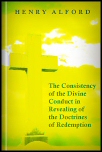
The Hulsean Lectures, a series established at Cambridge University in 1777, were originally meant to be given by clergymen at Cambridge on topics such as the evidence of revealed religion, prophecies and miracles, and difficult or obscure biblical texts. Henry Alford himself lectured, and this volume is the culmination of his Hulsean Lectures at Cambridge in 1841, containing eight lectures and two sermons. Building on each other, the lectures combined make up an astute theological resource, rich with insight regarding the divinity of God, the fall of man, Christ’s atonement, the cross of Christ, and the Resurrection.
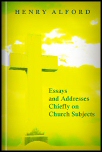
Published in 1869, these works are reactionary essays towards current events and doctrines of the Church of England during Alford’s life. Expounding on his belief that we are made of three parts—body, soul, and spirit—he contradicts the commonly held belief of that day that humans are body and soul only. Also addressed in this work is Alford’s dislike of the Act of Uniformity of 1662, which he calls a “disastrous blunder.” This leads him to expound upon his distress over the growing schism of the Church of England.
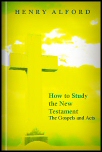
There could be nobody better than Henry Alford to address the question of how to approach the study of the New Testament. Alford, who spent the better part of 20 years on The Greek Testament by Henry Alford, knows the New Testament inside and out. How to Study the New Testament: The Gospels and Acts shows Alford’s ability to break down his insights and experiences into an easily understandable and highly practical tools for biblical study that will be quite advantageous to all who read it.
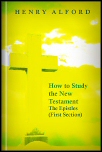
The second of three practical applications of New Testament studies, this volume covers 1&2 Thessalonians, 1&2 Corinthians, Galatians, Romans, Colossians, Philemon, and Ephesians, and is a detailed, informative, and easily comprehendible guide to the Epistles. This resource is an excellent complement to How to Study the New Testament: The Gospels and The Acts of the Apostles.
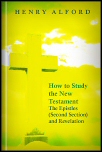
Wrapping up notes for the remainder of the Epistles, Alford ends his New Testament study guide series by delving into the book of Revelation. Alford’s three volumes of study guides are a highly comprehensive overview of how to approach the New Testament in a scholarly and effective manner.
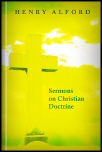
Henry Alford, dean of Canterbury, preached this eclectic set of 25 theologically-intense sermons on Sunday afternoons in the Canterbury Cathedral between the years 1861–1862. “Truthfulness, guilelessness, fearlessness—these were the thoughts of his heart: and as he thought, so he spoke,“ Thun Switzerland says of Alford in the preface to these powerful sermons.
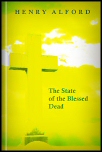
We all die. Some view death as a thing to be feared; some see it as the end. The question Alford asks is this: what happens when we die? As he closely examines the Scriptures, he brings his readers with him, using the Bible as the basis for his conclusions on one of the most important questions that we all must eventually face both in our own lives and the lives of those we love.
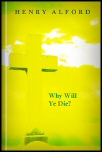
In a sermon preached on June 28, 1857, Alford preached on the text from Ezekiel 18:31. Death came into the world through sin, he explains thoroughly in this 28-page complementary resource to The State of the Blessed Dead. A careful scrutiny of a painful subject, this volume can also provide great hope and encouragement.
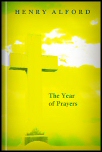
In his book The Year of Prayer: Being Family Prayers for the Christian Year Suited to the Services and Commemorations of the Church, Henry Alford wrote and compiled a three-part book of invocations for morning and evening, special occasions, and important days within the church calendar. Written prayer can be a powerful tool, and this resource offers a great variety of accolades, supplications, and petitions.
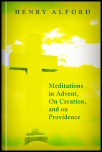
Meditations: In Advent, on Creation, and on Providence is composed of sermons preached in Canterbury Cathedral by Alford. The main themes throughout these sermons deal with incorporating God’s truth in our everyday lives, and Alford delivers the messages with earnestness and resolve.
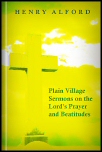
Many of the sermons in this collection formerly appeared in a series entitled The Nottingham Church Tracts. Always bringing his sermons back to the saving power of Christ, Alford once again preaches the Gospel in a compelling and refreshing manner.
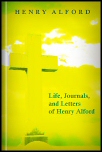
Interspersed with some of his writings in the form of poems, letters, and journal entries, this biographical work details the life of former dean of Canterbury, Henry Alford. His widow, Fanny, edited her husband’s absorbing life story.
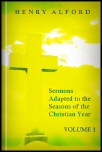
Henry Alford’s son, realizing that his father had so much more to offer even than the well-loved work, The Greek Testament by Henry Alford, picked through 32 sermons from a time span of more than eight years, in order to pay homage to the amazing content of Alford’s sermons. As Alford himself states “The times in which we live are so solemn, that allusions to them from the pulpit assume more than occasional interest, and the instructions derived from them may, by God’s blessing, continue to work long after they were first uttered.”
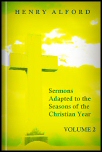
After the great success of the first volume of sermons compiled by Alford’s son, Selection Adapted to the Seasons of the Christian Year from the Quebec Chapel Sermons, vol. 2 was born. Texts from Joshua, 1 Samuel, John, Acts, and more are covered in this sermon compilation that will bless all who read it.
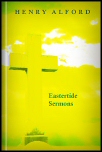
Alford draws us into his sermons about the resurrection by showing the reader how much we today can identify with the journey of the disciples and women that discovered Christ’s empty tomb. Many wrestling with the Bible have experienced the shattering of all we have known to be true, as was with the disciples when they first mourned Christ’s death and then in shock realized that he did indeed rise from the grave as he had promised. These four sermons begin with Christ’s resurrection and end with his ascension.
Henry Alford (1810–1871), a member of the Anglican Church, was an English theologian, textual critic, poet, writer, and hymnodist. Alford studied at Cambridge and became a Hulsean Lecturer there, after which he moved to London where he pastored a large church and became the dean of Canterbury. Other famous literary works of his include the lyrics to the hymn Come Ye Thankful People Come and The Greek Testament by Henry Alford.
Reviews
4 ratings
Ray Timmermans
12/11/2016

Larry Proffitt (I
11/13/2013

Caleb Allen
10/12/2013
Gary Pajkos
7/18/2013